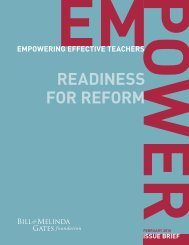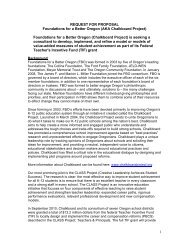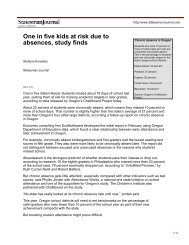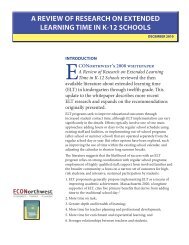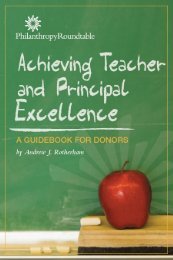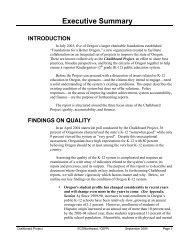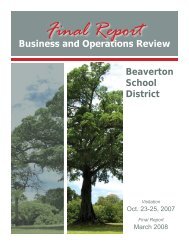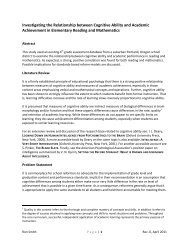Tapping the Potential - Alliance for Excellent Education
Tapping the Potential - Alliance for Excellent Education
Tapping the Potential - Alliance for Excellent Education
Create successful ePaper yourself
Turn your PDF publications into a flip-book with our unique Google optimized e-Paper software.
TA P P I N G T H E P O T E N T I A L : R E TA I N I N G A N D D E V E L O P I N G H I G H - Q U A L I T Y N E W T E A C H E R SSuccessful mentors are insightful, patient, empa<strong>the</strong>tic, and enthusiastic, and mustbe <strong>the</strong>mselves willing to collaborate and learn.At <strong>the</strong> heart of <strong>the</strong> SCNTP induction program is <strong>the</strong> New Teacher Center FormativeAssessment System (NTC FAS), a new teacher professional development systemgrounded in <strong>the</strong> SCNTP Developmental Continuum of Teacher Abilities. NTC FASprovides mentors with tools to move beginning teacher practice <strong>for</strong>ward: classroomprofiles, collaborative logs, individual learning plans, self-assessment summaries, protocols<strong>for</strong> collection and analysis of student work, and pre- and post-observation tools.One-sixth of Cali<strong>for</strong>nia BTSA programs use NTC FAS, and it is also used by school districtsoutside Cali<strong>for</strong>nia.New SCNTP mentors receive intensive training focused on using <strong>the</strong> NTC FASprior to <strong>the</strong> opening of school. They learn to use protocols to observe new teachers,collect student data, and analyze student work to help new teachers plan standardsbasedinstruction. Advanced training in effective coaching skills accompanies thistraining. During <strong>the</strong> academic year, mentors attend weekly half-day Mentor Forums,<strong>the</strong> cornerstone <strong>for</strong> building mentor skills and abilities. Forums provide additionalprofessional development in topics such as literacy, mentoring <strong>for</strong> equity, and contentbasedmentoring. They are <strong>the</strong> venue <strong>for</strong> mentors to network, share successes anddilemmas, support each o<strong>the</strong>r’s practice, and ensure that <strong>the</strong> SCNTP model continuesto evolve to meet current classroom needs. Mentors use <strong>the</strong> same process of data collection,self-assessment, and revision of practice that <strong>the</strong>y present to new teachers toimprove <strong>the</strong>ir own practice.Common Planning Time and CollaborationBe<strong>for</strong>e <strong>the</strong> start of <strong>the</strong> new school year, SCNTP beginning teachers attend a daylongorientation, where <strong>the</strong>y first meet <strong>the</strong>ir mentors. Mentors typically arrange tomeet twice with beginning teachers prior to <strong>the</strong> beginning of school to help <strong>the</strong>m setup classrooms and procedures, and <strong>the</strong>reafter meet weekly, one-on-one, be<strong>for</strong>e, during,and after class throughout <strong>the</strong> academic year. Because SCNTP mentors work fulltimesupporting fifteen new teachers, <strong>the</strong>y are able to work in two-hour time blocksthat include pre- and post-observation conferences.Ongoing Professional DevelopmentThe SCNTP provides mentors with systematic protocol <strong>for</strong> new teacher development,but allows <strong>the</strong>m to adapt support to new teachers’ specific needs and classroomcontexts. Although mentors provide emotional support and help with classroom management,<strong>the</strong>ir goal is always to focus beginning teachers on improving instruction.They work to build a teaching profession aimed at meeting student needs by continuouslyreflecting on and improving <strong>the</strong> practice in collaboration with o<strong>the</strong>r teachers.Even <strong>for</strong> first-year teachers, mentors concentrate on lesson planning, analyzing studentwork, collecting and analyzing classroom data, and revising instruction. They coteach,provide demonstration lessons, arrange <strong>for</strong> observation of exemplary teachers, facilitaterelationships with principals, and provide access to district and communityresources. Mentors and beginning teachers create a portfolio that documents annualprogress toward instructional goals. For second-year teachers, mentor support placesgreater emphasis on content-specific pedagogy and differentiating instruction.37



